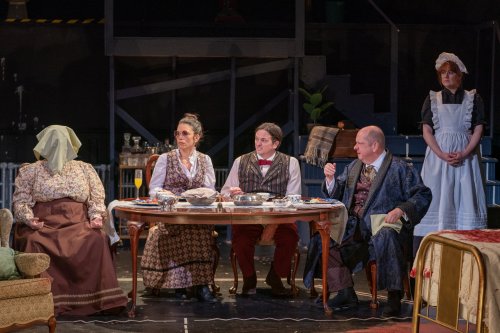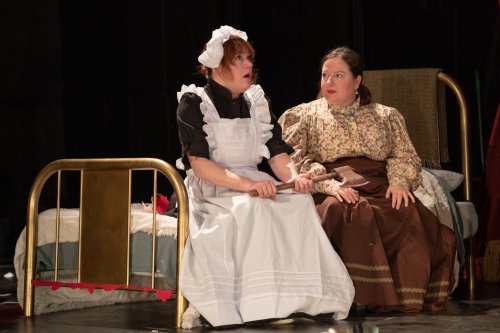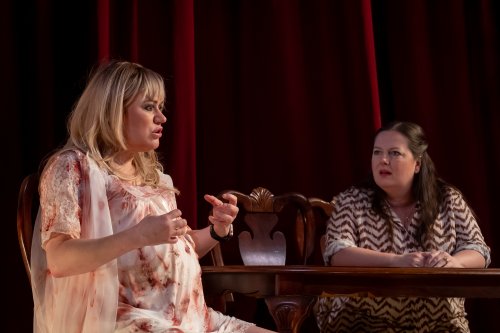Fall River Fishing
Whatever your feelings about Lizzie Borden's guilt, she didn't deserve this play.

Zuzanna Szadkoski, Susannah Milonzi, Jamie Smithson, Tony Torn and Deb Knox in a scene from Bedlam’s production of “Fall River Fishing” by Zuzanna Szadkowski and Deb Knox at the Connelly Theatre (Photo credit: Ashley Garrett)
Like the rest of Zuzanna Szadkowski and Deb Knox’s new play Fall River Fishing, its title is meant to be comedic. For that desired sense to register, however, you would need to know a couple things. First, Fall River, Massachusetts was the home of the notorious Lizzie Borden whose trial for hatcheting her father and stepmother to death became a Gilded-Age cause célèbre. And, second, casting a rod into a body of water had nothing to do with the gruesome murders. Of course, even if you did possess that information, laughter is still not the obvious response.
Absurdist to an increasingly ho-hum degree, Szadkowski and Knox let their imaginations run amok with silly speculations about pre-double-homicide life in the Borden household that are punctuated by head-scratchingly anachronistic jokes involving Tinder, Cabbage Patch Kids, John Belushi, and whatever other free associative references apparently sprung to mind during their no-doubt personally enjoyable writing sessions together. The problem is that Szadkowski and Knox are incapable of bridging the gap between their evident fun and our actual entertainment, an obnoxious shortfall made cringe-worthy by the fact that they both star in Fall River Fishing. For the charitable among us, I suppose, seeing Szadkowski and Knox delivering their own unfunny dialogue might compel a forced giggle, especially in such close downtown quarters. But theater is expensive and time is fleeting, so a lack of chortling generosity is also perfectly understandable.

Deb Knox and Zuzanna Szadkoski in a scene from Bedlam’s production of “Fall River Fishing” by Zuzanna Szadkowski and Deb Knox at the Connelly Theatre (Photo credit: Ashley Garrett)
Blood-spattered from the get-go, Cate McCrea’s vaguely Victorian set is the playground for Szadkowski’s Lizzie, an aspiring actress who browbeats the family maid Bridget, portrayed by Knox, into doing her most menial bidding. That includes helping Lizzie to stage theatrical productions in her bedroom, like an Eva Braun/Hellen Keller mashup with Hitler cameo that Szadkowski and Knox, wisely, leave purely conceptual. Bridget’s constant readiness to debase herself even further than the requirements of her subaltern position stems from a love for Lizzie that, one surmises, is performatively returned out of aristocratic ennui rather than genuine affection. Ascribing motivations to any of the characters, though, wagers that Szadkowski and Knox gave them that much thought, which seems like a pretty bad cognitive bet.
Rather, the extent of the writing plan seems to have been to just ramp up the outrageousness until Fall River Fishing had them rolling in the aisles. But the play quickly falls prey to the law of diminishing returns when it comes to sophomoric humor, as Szadkowski and Knox desperately try to wring yucks out of murder, incest, and, lest you think the production possibly too restrained for the scatological, a toilet positioned high above the action at the back of the stage. To be fair, when a character clambers up to it and drops trou for what feels like an eternity (that poor actor!), Szadkowski and Knox do finally earn a yuck, as well as an ick and an ugh.

Jamie Smithson, Zuzanna Szadkoski, Tony Torn and Susannah Milonzi in a scene from Bedlam’s production of “Fall River Fishing” by Zuzanna Szadkowski and Deb Knox at the Connelly Theatre (Photo credit: Ashley Garrett)
To simply affirm that the rest of the cast is blameless undersells their talent in getting most of the audience to return for the completely superfluous second act, which, I guess, means they should be blamed for something. As Nathan, Lizzie’s lascivious uncle, Jamie Smithson is a twitching delight, nervously attempting to woo his niece without charm or compunction. Admittedly, nothing Smithson says is remotely amusing, but he never gives that away in his acting. Moreover, as the pointlessly long occupant of that porcelain throne, Smithson evinces the type of commitment to a role that an equitable universe would eventually reward with an opportunity worthy of that effort.
As the soon-to-be-bludgeoned Andrew and Abby Borden, Tony Torn and Susannah Millonzi are equally wasted while giving it everything they’ve got. Their characters, unsympathetic victims to the extreme, relentlessly verbally abuse Lizzie–their preferred cruelty being body shaming mixed with attacks on her intellect and ambition–firmly establishing a motive for why Lizzie may have been spurred to so brutally off the two of them. But instead of going with the conspicuous culprit, Szadkowski and Knox concoct a true-crime twist at the end of act one that readies us for whatever farcical courtroom shenanigans we’re meant to endure after the intermission.

Deb Knox and Zuzanna Szadkoski in a scene from Bedlam’s production of “Fall River Fishing” by Szadkowski and Knox at the Connelly Theatre (Photo credit: Ashley Garrett)
Except that’s when Szadkowski and Knox throw a curveball, plunking the audience in the head with A Doll’s House parody and special guest appearance from the ghost of Sharon Tate. A few tenuous connections to the first act notwithstanding, it’s odd to basically witness the abandonment of a play midway through its performance, but, honestly, I can understand why everyone thought it was worth a try. Unfortunately, director Eric Tucker has less luck shaping this new mess of poorly formed comical nonsense into something engaging than he did the old one. If anything, confusion reigns even more supreme as Szadkowski and Knox’s misbegotten fever dream of a second act sputters towards a conclusion that, for all that it resolved or meant, could have been plopped anywhere in the play or excised entirely. Given a merciful choice, my vote would have been for the latter.
Fall River Fishing (through March 9, 2023)
Bedlam
The Connelly Theater, 220 East 4th Street, in Manhattan
For tickets, visit http://www.bedlam.org
Running time: two hours and 20 minutes including one intermission
Whatever your feelings about Lizzie Borden’s guilt, she didn’t deserve this play.






Leave a comment